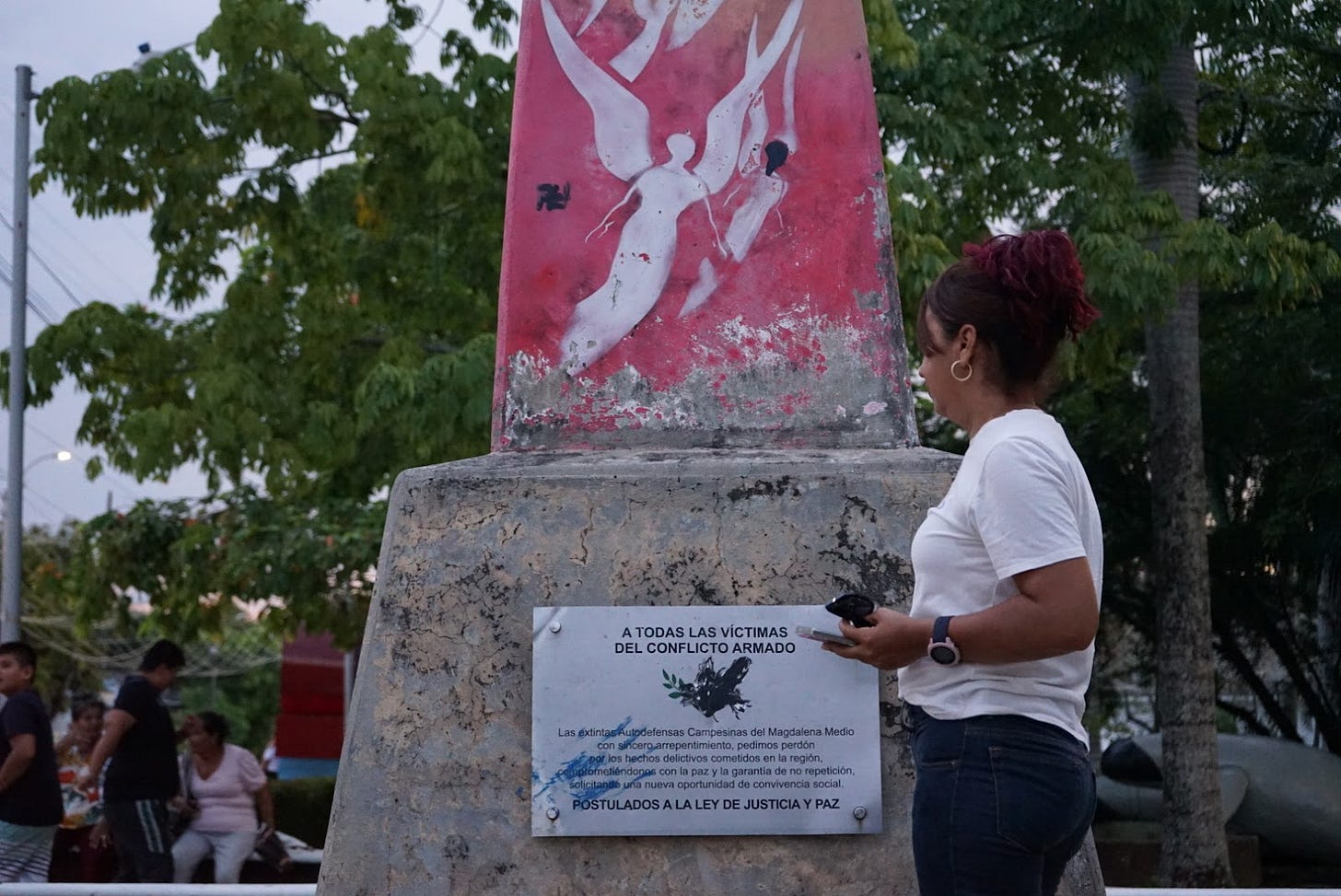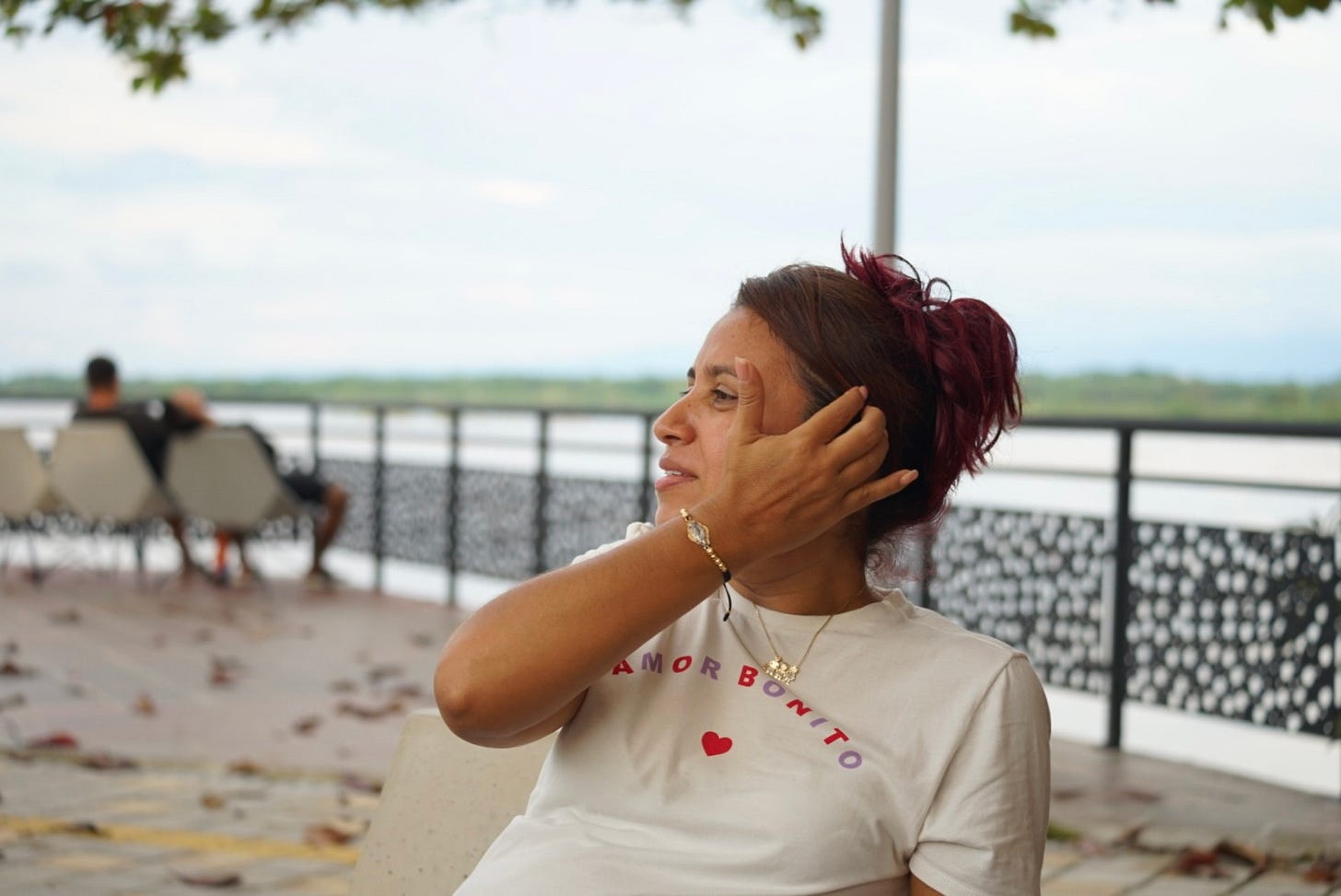Jeny Castañeda: "Forgiveness is Personal"
The story of a victim of armed conflict who not only forgave but also befriended her mother's murderer, one of Colombia's most infamous paramilitary leaders.
Jeny Castañeda Mejía spent nearly a decade seeking justice for her mother, a social leader murdered by right-wing paramilitaries under the command of Ramón Isaza.
Isaza was a prolific sadist, responsible for hundreds of murders between 1977 and 2006. For 35 years, he ruled through terror—using torture, murder, sexual violence, and forced recruitment to maintain control. Many victims were dismembered and thrown into the Magdalena River, leaving their families to this day without answers about how or why their loved ones were killed.
Jeny’s quest to hold Isaza accountable for her mother’s killing took an astonishing turn. Seeking revenge, she found forgiveness instead—and, in an extraordinary act of reconciliation, became both Isaza’s friend and lawyer.
We met her in Puerto Triunfo, on the riverfront promenade along the Magdalena River. As evening fell and the day's oppressive heat finally lifted, she shared her remarkable life story.
In her own words
My name is Jeny Castañeda Mejía. I am from Puerto Triunfo, in the Magdalena Medio region of Antioquia. I am the daughter of Damaris Mejía Ramírez.
My mother was murdered on September 17, 2001, on the old Hacienda Nápoles estate, which once belonged to Pablo Escobar.
She had been a beloved social leader in her community, always looking out for the vulnerable and people who had nothing. With the blessing of Juan Guillermo Garcés, she’d built two informal settlements on his land.
She wanted to build a third and she decided to occupy the abandoned Hacienda Nápoles to do it.1 That pissed off the then-mayor.
He showed up one afternoon and they had a big fight. He told her she had to vacate the land and she responded, “over my dead body.”
As he drove away, the mayor called back that she had until nightfall. And if she didn’t get out on her own, he said he’d come back and get her out, dead or alive.
“I’ll be waiting for you,” she told him.
Later that day, the mayor went to find Ramón Isaza to complain about my mother. “There’s this social leader, who took over the Nápoles estate,” he’d told him. “She’s a pain in the ass. Told me she’d only leave the land in a body bag.”
Ramón had been drinking, he didn’t know who this leader was. He gave the order to kill her.
The paramilitaries went shack by shack through the settlement, searching for my mother.
When they found her, they put six bullets in her head. Right in front of her own people.
It was a tragedy.

I reported my mother’s case to the Prosecutor’s Office. Obviously, they weren’t going to do anything because the mayor was very influential, and the paramilitaries were still active. The case stagnated - it remained with the prosecutor.
Then, in 2006, the paramilitaries demobilized. They entered a process called Justice and Peace. They handed over their weapons to the government, signed an agreement, and began acknowledging the victims of the armed conflict.
In their first statement, they admitted to 600 murders including that of my mother.
That’s when my journey with Justice and Peace began.
I started attending court hearings. I wanted to know the truth about what had happened. Why had they killed my mother? What could have motivated them to do what they did, knowing that all she did was help poor people?
For eight years I went to the hearings in Bogotá. Ramón Isaza claimed that my mother was a land thief. He refused to acknowledge her as a social leader. For eight years, I gathered evidence to prove that she was one and brought it to court.
In the end, Isaza finally recognized my mother as a social leader. And he acknowledged that her murder had been a terrible mistake.
I’d waited such a long time to hear him say that. After I left the hearing, I broke down in tears. I’d finally done it!
Then came the moment when Ramón Isaza asked for my forgiveness.
“No, you old son of a bitch.” I told him. “You killed my mother. You don’t know what family means. Ask God for forgiveness. But God doesn’t forgive sons of bitches like you.”
He lowered his eyes.
“Look me in the face, don’t be a coward,” I told him.
At that moment, I felt proud of myself.
That was in October. In December, my mother came to me in a dream. She told me I was very sick. But I didn’t pay much attention to it.
Around January 15, a doctor told me I had thyroid cancer which had spread to the lymph nodes.
At that time, my son was 10 years old. He begged the doctor treating me not to let his mom die. He said that I was all he had.
I was in treatment when my mother came to me in a dream again. She told me that Ramón Isaza would come to ask for my forgiveness and that I had to forgive him.
That wasn’t a dream, that was a nightmare. When I woke up I called my sister, my brother, my husband as well as a priest, José Hernan, an old friend of my mother’s. I told all of them about the dream.
Fifteen days later, I received a message: Ramón Isaza wanted to see me in prison.
I decided to go. When we met, Ramón told me that when he found out about my cancer, he started praying every day, asking God to heal me.
At that moment, there was a knock at the door, and the priest José Hernan entered. When he saw me, he said, “Jeny, have you done what your mother asked of you?”
So I told Ramón, “Mr. Ramón Isaza, my mother wants you to know that she is at peace and she has forgiven you.” I hugged him and gave him the kiss my mother had asked me to give him.
I felt as if a dagger had been pulled from my heart.
I am convinced that if I had never gotten cancer, I would never have forgiven him. Because the illness taught me to see life differently. And at the same time, it forced me to let go of some of my anger.
Because I had been part of a committee to represent the victims of Colombia’s armed conflict, I won a scholarship to study law.
I applied to the university and passed the interview. Thanks to the scholarship, the tuition was nothing compared to what it usually is. But it was still too expensive.
Ramón found out that I had passed the university exams and sent his son, Oliverio, to talk to me.
He told me, “I will pay for your university because it’s my father’s wish. I will help you as much as you allow me to.”
And they did. When my illness set me back, they helped me transfer to another university where I could continue my studies. That’s where I ultimately graduated as a lawyer.

Last November, the government issued a resolution declaring Ramón Isaza a gestor de paz (peace facilitator).2 The next day, he called me and asked me to be his lawyer, to continue our journey together.
This scared me. But at the same time it made me happy that he thought of me. It means our story goes on and shows the evolution of our journey to the entire country.
Over these 23 years, what began as a process of hatred ended as a process of forgiveness and reconciliation.
It’s not easy to forgive. But it’s also not easy to ask for forgiveness.
Forgiveness is personal, and everyone goes through their own process. But I know I have planted the seeds in many people who have lived through similar situations.
OffMap Media’s Reflections
Though still ill, Jeny is a forceful presence, her storytelling vivid, her voice unwavering in its strength. Her journey is a powerful testament to forgiveness and resilience.
However, it is important to acknowledge that many other victims have had vastly different experiences following the paramilitary demobilization and the subsequent Justice and Peace process.
A report by Colombia’s Centro de Memoria Histórica (Center for Historical Memory) details how some victims faced threats after testifying in court hearings on Isaza. Many remain deeply unsettled by the return of former paramilitaries to their towns—often accompanied by bodyguards and traveling in armored cars, as if nothing had changed.
This interview is part of our “In Their Own Words” series. It has been translated and edited for clarity and readability - nothing else.
Land distribution in much of the Magdalena Medio region, as in the rest of Colombia, is highly unequal. Historically, land concentration has been driven by colonial legacies, state policies favoring large landowners, and violent dispossession during the armed conflict. In response, poor peasants have engaged in informal land settlements, often occupying unused or underutilized land. These settlements have been both a survival strategy and a form of resistance, occasionally leading to formalization through land titling programs. However, such processes remain slow and contested, often resulting in further displacement or violent evictions.
In November 2024, the Colombian government appointed 18 former paramilitary leaders from the United Self-Defense Forces of Colombia (AUC) as "peace facilitators" including Ramón Isaza. According to President Gustavo Petro, the initiative aims to conclude the demobilization process that began in 2005 and ensure the restitution of assets to victims.







thank you for sharing this story..forgiveness is as powerful as it is personal and maybe this is a lesson I needed to read today :)
A great and moving story! Thank you both, Anastasia & Douwe, and good luck to this brave and strong woman